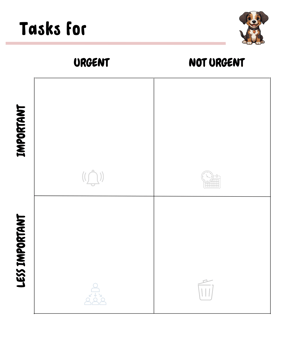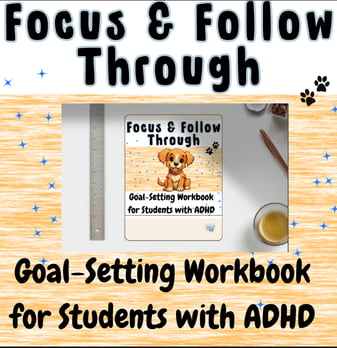Spring Cleaning Tips: Time Saving Tips for SLPs
We all have a lot on our plates, but prioritizing tasks is one key to help with efficiency. Check out this free digital tool to manage your to-do list and additional tips to streamline your workflow this spring.
SELF-CARE
3/2/20254 min read


Spring Cleaning
What is it about spring and fresh starts? With the fresh air, I’ve had spring cleaning on my mind.
Speech-language pathologists (SLPs) have a lot on our plates. Organization is a two-part dilemma. One challenge is creating a system. The second challenge is implementing that system consistently.
Below I have tips from my own experience as an SLP, and working with students who struggle with organization over the years.


Eisenhower Matrix
I have been playing around with the Eisenhower matrix this spring. Are you familiar with this one? It is a four square matrix that helps you break up your to do-list into items by priority.
From left to right, the focus is on urgency. What things are due today and must be done before you finish your workday?
From top to bottom, the focus is importance. What items are most important to you showing competence in your job and what items can be pushed back?
To help you out, I created a FREE Eisenhower matrix that you can download here and use tomorrow.
Time Management Tips
Here are a few more tips that have helped me over the years. I hope they help you too!
1: Limit your to-do list
1. Don’t put more than five items on your daily list at work. Although you might get more than five things done in a single day, it feels defeating when you have dozens of items listed that you don’t get to.
I try to think of my my top five priorities for the day when I make a list or Eisenhower matrix, and limit it to my professional scope. If I start adding items as a parent, wife, friend or a pet owner, the list just gets overwhelming. Instead, I make separate matrixes for each area of my life.
2: Set a timer
It is incredibly helpful to set a timer to manage time blindness if this is something you experience.
The reality is we all have 24 hours in the day, no matter how much pressure we feel. So block off your time into chunks and set actual timers to focus. If you only have 30 minutes to work on an IEP that’s how much you have.
This helps you prioritize what needs to be done first (e.g., writing goals), and what can wait in terms of details.
If you’re working on progress notes and you have 30 minutes, you might start with just adding one sentence for each student and then if you have more time, go back and add more details.
Remember the 60% rule? We want to do our job well, but the goal is not perfect. You are human and this helps rain in the to do list as well as prioritize. What needs to be done first.
3: Online data collection
Recently at my doctor's office, the pediatrician paused as we talked to type notes. It occurred to me that many SLPs go back after sessions to write SOAP notes or document data. We should be doing this in real time, during sessions!
Keeping data in real time will save you hours of energy and time. If you have a SOAP note template, just have it open on your laptop as each session occurs.
Another strategy is to have a binder with tabs for each student and pre-printed data sheets so you can quickly check off data as you go.
A digital option is to create a Google fillable form that you can have open for one student per session and enter percentages towards goals. At the end of the quarter, download the Google form as a spreadsheet to quickly access all your data.
A Google form also works well for parent communication. It’s easy to lose track of phone calls conversations, prior notices, emails, etc. If you have parents who want a lot of contact, a Google form that you can quickly open and note the interaction in one place is a great idea. This allows you to download a spreadsheet if a parent ever calls on you for records or documentation related to your communication with them.
This month, try using one of these strategies and let me know if it saves you time and helps with organization. Drop me a line if you have a great time saving idea for other SLPs!
Subscribe to get monthly freebies!
Enjoy 2 emails per month with free PDFs you can use in sessions tomorrow. Unsubscribe anytime.
Resources
Join my pack and get started with free neurodiversity-affirming handouts for speech-language pathologists.
contact
Connect
© 2024. All rights reserved.




